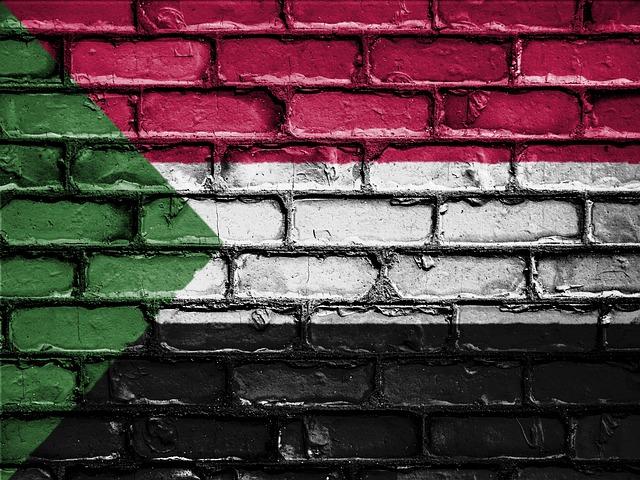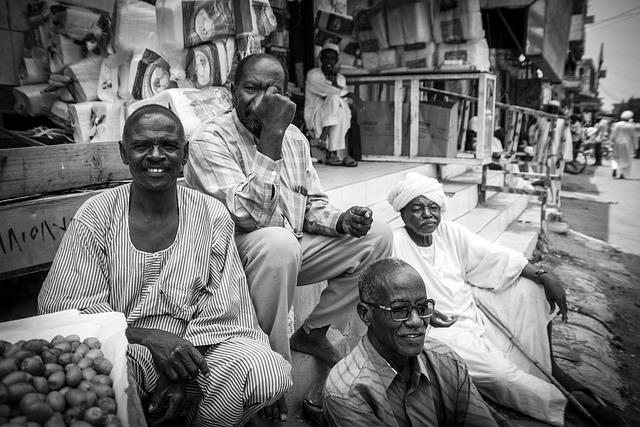In recent months, the ongoing crisis in Sudan has shifted from a domestic struggle for power and resources to a complex battleground of foreign intrigue and strategic corruption. As various international actors seek to exploit the turmoil, the Atlantic Council highlights how Sudan has become a focal point for malign influences that threaten not only its stability but also regional peace and global security. From proxy conflicts and illicit financing to the manipulation of local factions, the situation in Sudan exemplifies the intricate web of geopolitics at play, raising urgent concerns about the long-term implications for the Horn of Africa and beyond. As the international community grapples with how to respond, understanding the dynamics of foreign involvement in Sudan is more crucial than ever.
The Roots of the Sudan Crisis: An Overview of Internal Strife and Power Struggles
The ongoing crisis in Sudan is deeply rooted in a complex web of internal conflicts and power struggles that have plagued the country for decades. The legacy of colonial rule has left a fragmented society marked by ethnic and regional divisions. The struggle for power among various military factions, tribal leaders, and political elites has escalated, resulting in severe instability and violence.Key contributing factors to this internal strife include:
- Historical Grievances: Long-standing issues such as marginalization of specific ethnic groups and unequal distribution of resources have festered.
- Military Rivalries: Infighting among the Sudanese Armed Forces and various militias has led to a power vacuum and the proliferation of armed groups.
- Political Corruption: Governance marked by nepotism and corruption has eroded public trust and fueled dissent.
The power struggle in Sudan is not merely a local issue; it has attracted foreign actors seeking to exploit the chaos for their strategic interests. External governments and organizations have meddled in the crisis, providing military support or funding to various factions, further complicating the landscape. This influence often exacerbates existing tensions and prolongs violence rather than fostering resolution. A closer look reveals:
| Foreign Actors | Interests |
|---|---|
| Russia | Military partnerships and resource extraction |
| China | Investments in infrastructure and energy |
| Western Nations | Humanitarian aid and democratic reforms |
This multifaceted crisis highlights the intertwined nature of internal dynamics and external influences, emphasizing the urgent need for a comprehensive approach to peace-building that addresses both local grievances and international stakes.

Foreign Actors in Sudan: Unpacking Malign Influences and Strategic Interests
The recent unrest in Sudan has attracted a diverse array of foreign entities eager to leverage the chaos for their strategic objectives. these malign influences manifest through various channels, including state-sponsored interventions, corporate interests, and non-state actors. Notably, the involvement of regional powers such as Egypt and the United Arab Emirates highlights a complex interplay where military postures and economic investments overlap. Amidst these actors, foreign coalitions often exploit instability, trying to further their agendas without acknowledging the humanitarian consequences on the Sudanese populace. This phenomenon is not merely opportunistic; it is part of a broader struggle for dominance in a resource-rich environment.
Furthermore, the ramifications of such foreign entanglements extend beyond immediate political gains and venture into strategic corruption. The influx of resources and arms often leads to a degradation of local governance, as corrupt partnerships form between Sudanese elites and foreign players. This creates a vicious cycle where foreign interests prioritize profit over stability and development. The implications are stark and multifaceted, with the potential to perpetuate conflict rather than ensure peace. As actors engage in a high-stakes game that prioritizes strategic interests, the plight of ordinary Sudanese citizens remains largely marginalized. The urgent need for a coordinated international response signals a crucial moment in addressing these enduring challenges.

The Impact of External Interference on sudan’s Stability and Governance
The crisis in Sudan has drawn not only humanitarian attention but also a deluge of foreign interventions that have exacerbated the political and economic turmoil.Various international actors are exploiting the instability for their strategic gains, which has led to a complex web of alliances and rivalries. Key influences include:
- Economic Investments: Competing nations are making considerable investments in sectors like oil and agriculture, often binding Sudan’s future to their geopolitical interests.
- Military Support: Regional powers are supplying arms and training to various factions, further complicating the conflict and fostering an environment of lawlessness.
- Proxy Wars: Sudan’s fractured political landscape has become a theater for proxy conflicts, with external forces backing different groups, prolonging the strife.
This external interference has a detrimental effect on governance, hampering efforts to establish a stable and functional state. With divergent objectives, external actors often prioritize short-term gains over the long-term stability of Sudan. As illustrated in the table below, these influences can distort local governance structures and undermine democratic processes:
| influencing Actor | Impact on Governance |
|---|---|
| Regional Powers | Support authoritarian regimes, reduce accountability. |
| Foreign corporations | promote exploitative practices, discourage sustainable development. |
| International NGOs | Provide aid but can create dependency, limiting local agency. |

Corruption Dynamics: How Foreign Influence Fuels Illicit Practices in Sudan
The ongoing crisis in Sudan has attracted a plethora of foreign entities seeking to exploit the chaos for their strategic gains. As various factions vie for power, foreign countries and corporations are infiltrating the region, often blurring the lines between legitimate investment and corrupt practices. This manipulation of Sudan’s political landscape can lead to a range of illicit actions, including:
- Bribery and kickbacks: Local officials are often coerced into accepting payments in exchange for favorable laws or contracts.
- asset stripping: Foreign entities may acquire state-owned enterprises at undervalued prices, depriving the local economy of essential resources.
- Militarization: External powers might fund militia groups that align with their interests, exacerbating violence and instability.
This relationship between foreign influence and corruption not only undermines Sudan’s sovereignty but also perpetuates a cycle of poverty and unrest.As crucial resources are diverted away from social needs, ordinary Sudanese citizens remain trapped in a system that prioritizes foreign profit over local welfare. The implications extend beyond Sudan’s borders, affecting regional stability and international perceptions of the nation. A clear exhibition of this dynamic can be illustrated in the following table:
| Foreign Influence | Corruption Tactics | Impact on Sudan |
|---|---|---|
| Governments | Funding rebel groups | Increased violence |
| Corporations | Undervalued resource acquisitions | Decreased public funds |
| NGOs | Network exploitation | Diminished trust |

Strategies for Mitigating Malign Influence: Recommendations for International Engagement
Addressing the complex landscape of malign influence in Sudan requires a multifaceted approach.Key strategies should focus on enhancing regional cooperation and promoting clarity in international dealings.To achieve this, stakeholders can:
- Establish a coordinated international task force that includes regional powers and global stakeholders, ensuring a united front against external attempts to manipulate local dynamics.
- Implement rigorous vetting processes for foreign investments and aid, aimed at identifying and preventing corrupt practices.
- Support civil society organizations that advocate for governance reform and accountability, empowering local actors to resist malign influences.
In addition,leveraging technology can play a critical role in countering strategic corruption.Utilizing tools like blockchain can enhance tracking of foreign aid distribution, while social media campaigns can raise awareness of malign activities. A set of recommended actions includes:
| Action Item | Description |
|---|---|
| Data Monitoring | Use real-time data analytics to track foreign activities and their impact on local governance. |
| Public Awareness campaigns | Launch initiatives to inform citizens about potential and existing malign influences. |
| Collaborative Platforms | Create forums for dialog between governments, NGOs, and citizens to promote shared knowledge and strategies. |

Pathways to Peace: Fostering Sovereignty and Rehabilitation in Sudan amidst Foreign Intervention
The multifaceted crisis in Sudan has deepened the challenge of restoring peace and stability while navigating the intricate web of foreign influence. To address this, a focus on national sovereignty and local rehabilitation efforts must take precedence. This involves empowering grassroots organizations and community leaders who understand the sociopolitical landscape. By prioritizing local knowledge and practices, Sudan can cultivate ownership of its recovery process, ensuring that initiatives reflect the unique cultural and social dynamics of the region.
In this context, collaboration with international partners should aim to enhance Sudan’s capacity rather than impose foreign agendas. Key strategies might include:
- Capacity Building: Training local governance structures to manage resources effectively.
- conflict Resolution Workshops: facilitating dialogue among conflicting parties to foster understanding and reconciliation.
- Economic Empowerment: Promoting small-scale enterprises that can thrive in the local economy, reducing dependence on foreign aid.
To further illustrate the dynamics at play, consider the following table that outlines the potential benefits of local versus foreign-led initiatives:
| Initiative Type | Potential Benefits |
|---|---|
| Local-led Initiatives |
|
| Foreign-led Initiatives |
|

Insights and Conclusions
the ongoing crisis in Sudan serves as a troubling reminder of how internal conflicts can attract foreign malign influence and strategic corruption, complicating efforts towards resolution and stabilization. The Atlantic Council’s analysis underscores the urgency for international stakeholders to reevaluate their approaches in response to the volatility permeating the region. As external powers vie for leverage, the people of Sudan remain caught in the crossfire, facing dire humanitarian challenges and a precarious future. Addressing the interplay of foreign interests and local dynamics is essential not only for the sovereignty of Sudan but also for regional stability in a world where strategic corruption can have far-reaching impacts. As the international community contemplates its next moves, the necessity for a coordinated and principled response has never been clearer, emphasizing the need for transparency, accountability, and support for the voices of sudanese citizens advocating for genuine change.







